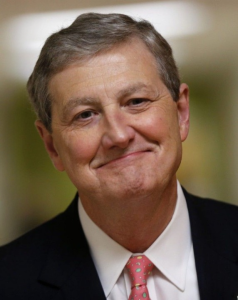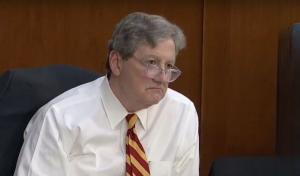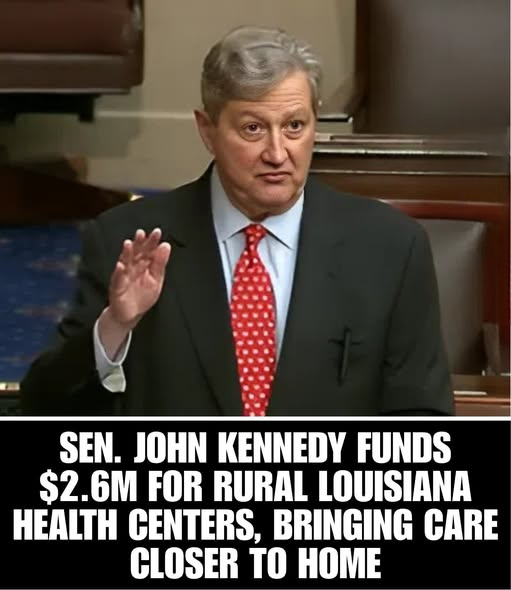The morning sun stretches lazily over southern Louisiana, painting the bayous in shades of gold and gray. Along a winding road lined with oak trees, the day begins in quiet rhythm—roosters crow, coffee brews on gas stoves, and a train hums softly in the distance. In towns scattered between cane fields and riverbanks, families rise before dawn.
Here, health care is not a quick trip to a local clinic. It is a journey—sometimes long, sometimes uncertain. For many, a doctor’s visit means hours of driving or waiting for a mobile van that may not arrive for weeks. For others, it means making a painful choice between paying for medicine or buying groceries.
That everyday struggle is what Louisiana Senator John Neely Kennedy sought to change. On an unremarkable weekday morning, in a modest community clinic with chipped paint and humming ceiling fans, he made an announcement that would ripple through every corner of the state.
The Announcement That Changed Everything
There were no flashing cameras or press banners that day—just nurses, local doctors, and a few townspeople packed into a small clinic room. Senator Kennedy adjusted the microphone, his Louisiana drawl steady but soft.
“No one should have to choose between medicine and dinner,” he said.
The words hung in the air. For a moment, there was silence—then a quiet murmur of gratitude. One woman whispered, “Bless his heart.” That sentiment captured the emotion in the room.
Kennedy announced a $2.6 million federal grant aimed at strengthening community health centers across rural Louisiana. The goal was simple but powerful: to ensure that every person, no matter how remote their home, could access basic medical care.
This grant wasn’t about politics or headlines—it was about people. About families who had waited too long for help. About nurses who had worked for years with outdated equipment. About the small towns that make up the beating heart of Louisiana.

The Heart of the Grant
The $2.6 million would be distributed among several community health centers—those quiet, essential buildings that serve as lifelines for residents of rural areas.
1. Modernizing Equipment
Some funds would go toward purchasing new medical tools—digital blood-pressure monitors, portable ultrasound machines, and vaccine refrigerators. In many clinics, staff had been sharing one stethoscope among several workers.
Nurse Maya Delacroix, from Franklin, nearly cried when she opened a crate of new stethoscopes.
“We’ve been using the same equipment for over a decade,” she said. “Sometimes we’d share one stethoscope between three people. When I heard about the grant, I called my mama right away. I told her, ‘Mama, we finally got help.’”
2. Training and Retaining Staff
Another portion of the funding would be dedicated to training young medical professionals. Too often, newly graduated nurses and doctors leave for bigger hospitals in Baton Rouge or New Orleans. This initiative gives them a reason to stay—to serve where they are most needed.
3. Expanding Mobile Clinics
The grant will also support mobile health units, those white vans with red crosses that travel down dusty country roads, setting up temporary clinics near churches and schools. For many residents, these vans are the only access point for vaccinations, checkups, and urgent care.
Each dollar of the grant, administrators say, will touch lives in ways that statistics can’t fully capture.

Stories from the Field
At a clinic in Plaquemines Parish, Dr. Raymond Louviere spoke quietly while the rain tapped against the tin roof.
“If we can afford insulin for everyone who needs it,” he said, “that’s already a miracle here.”
For Dr. Louviere and his team, the grant means more than new equipment—it means dignity. It means knowing that the people of their parish won’t have to suffer in silence because of cost or distance.
Maya’s Gratitude
When Maya unpacked those stethoscopes, her hands trembled—not from age, but disbelief. “We’ve waited so long for something like this,” she said. “Now, when someone walks in coughing or struggling to breathe, I know we can truly help.”
The Senator Who Stayed to Listen
After the announcement, Senator Kennedy didn’t rush off. He stayed to talk to the staff, to shake hands, to listen.
“What do you need most?” he asked a nurse.
“More hands,” she replied. “More people willing to come out here.”
“And you?” he asked a technician.
“Our X-ray machine’s older than I am,” the young man laughed.
Kennedy smiled and jotted a note on his pad. There were no cameras, no rehearsed lines—just quiet sincerity. One observer said later, “It was the most human thing I’d seen all week—a politician who didn’t sound like one.”
Standing in the hallway, coffee cup in hand, Kennedy looked around at the small clinic. The paint was peeling, but the air was filled with purpose.
“These are the people holding this state together,” he murmured softly.
Small Towns, Big Hearts
Louisiana is a land of contrasts—where jazz flows through city streets and cicadas sing in the countryside. It’s a state that has faced floods, storms, and hardship, yet never lost its sense of community. Here, faith and family often matter more than politics.
In Breaux Bridge, a mother of three named Claudette said the grant felt like an answered prayer.
“My youngest has asthma,” she explained. “We used to drive to Lafayette every time he had an attack. Now maybe the clinic here can handle it.”
Her voice wavered between hope and exhaustion. “You have no idea what that means to us,” she added.
For Claudette and thousands like her, the new funding means peace of mind—a safety net in a world where medical care is often out of reach.
Beyond the Numbers
On paper, $2.6 million is just a number. But in rural Louisiana, it represents countless moments of relief: a defibrillator that saves a life, a vaccine that prevents illness, a child who finally sleeps through the night without fever.
Every bandage, every checkup, every saved life can be traced back to that morning’s announcement and the simple truth behind it:
“No one should have to choose between medicine and dinner.”
The phrase spread across the state—printed in church bulletins, mentioned in small diners over plates of gumbo, repeated in clinics and homes. It became more than a quote; it became a symbol of compassion in public service.
A Ripple of Hope
Weeks after the announcement, deliveries began arriving—new exam tables, boxes of gloves, digital thermometers that actually worked.
At one clinic, staff gathered after hours to celebrate quietly. They played old jazz records, shared cornbread from a neighbor, and talked about the patients they hoped to help.
Dr. Louviere looked out toward the darkening sky. “It’s not the money that moves me,” he said. “It’s that somebody finally cared enough to notice.”
Outside, thunder rolled across the bayou. Inside, laughter filled the room—a sound of gratitude and renewal.
Letters of Thanks
A week later, a letter arrived at Kennedy’s office. It was handwritten on lined notebook paper, the kind used in rural schools.
“Dear Senator,
I don’t know if this letter will reach you, but I wanted to say thank you. My mama got her first check-up in five years. She smiled all day after that. God bless you.”
– A friend in St. Mary Parish
The senator’s staff said he keeps the letter on his desk, tucked under a paperweight shaped like the state of Louisiana.
That letter, simple and unpolished, says more than any press release could—it’s proof that small actions can light up entire communities.
The Light That Lingers
In a dimly lit clinic near Lafayette, a young doctor cleans a new blood-pressure monitor and places it carefully on a shelf. The hum of the generator mixes with the distant sound of frogs outside.
“We finally have what we need,” he whispers.
For most of the country, $2.6 million may seem like a modest grant. But in these towns, it feels like a lifeline cast across muddy waters—reaching hands that have waited too long.
Hope Under the Louisiana Sky
An elderly woman steps out onto her porch as the clinic’s van drives by, its logo glowing faintly in the streetlight: Community Health on Wheels. She waves even though no one sees her. Inside the van, a nurse checks her clipboard and smiles—they’re heading to another small town, another long day, another group of people who won’t have to choose between medicine and dinner.
And maybe that’s how real change begins—not with parades or speeches, but with quiet promises kept beneath the wide Louisiana sky.
A Legacy of Compassion
Senator John Neely Kennedy’s $2.6 million health grant is more than a policy decision—it’s a statement of values. It shows what can happen when government and community work hand in hand. It reminds us that progress doesn’t always come from sweeping reforms; sometimes it comes from one stethoscope, one van, one grateful family at a time.
In the years ahead, these clinics will continue to serve as beacons of hope. They will nurture the next generation of doctors and nurses, restore dignity to aging patients, and strengthen the bond between Louisiana’s rural families and their leaders.
The story of this grant is, at its core, a story about care—a reminder that even in a world of headlines and divisions, compassion still has the power to heal.
